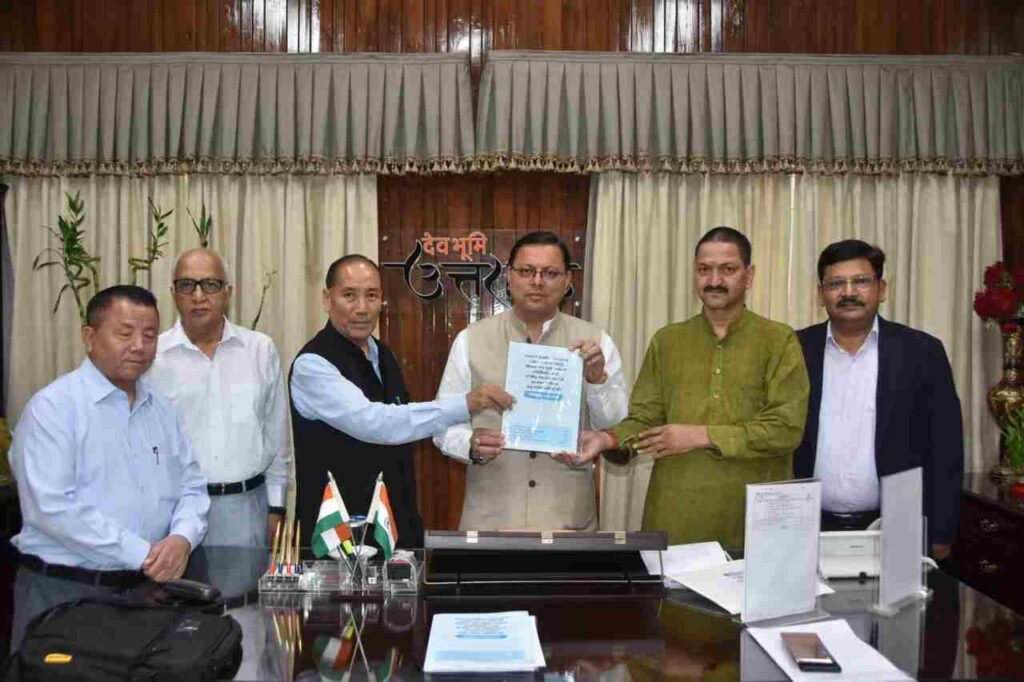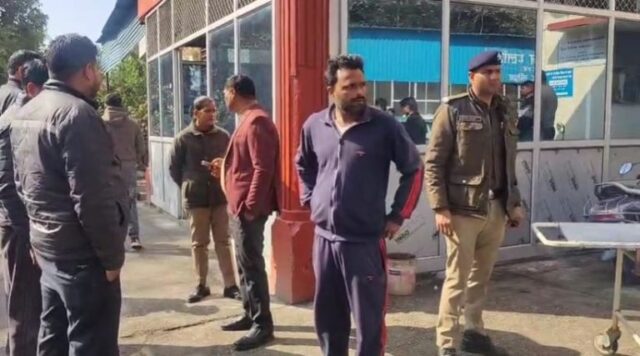Uttarakhand : Committee constituted on land law submitted report to CM Dhami- CM said, considering the recommendations in public interest and state interest, the government will make amendments

The committee constituted for the study and examination of land law in the state has submitted its report to the Chief Minister Pushkar Singh Dhami today. The committee has given its 23 recommendations to the government, establishing a balance between investment possibilities and uncontrolled purchase and sale of land in the interest of the state.
Today, in the Chief Minister’s Camp Office, the chairman of the committee and former chief secretary of the state, Subhash Kumar, committee member and Badrinath-Kedarnath temple committee member Ajendra Ajay, former IAS officers Arun Dhoundiyal and DS Garvyal and ex-officio member secretary of the committee. Deependra Kumar Chaudhary, who was holding the charge of Secretary Revenue till recently, met Chief Minister Dhami. On this occasion, Chief Minister Dhami said that the government would soon consider the recommendations of the committee in the larger public interest and in the interest of the state after thoroughly studying the report of the committee and would amend the land law.
In July 2021, CM Dhami constituted a high level committee
It is noteworthy that after being appointed the Chief Minister of the state in July 2021, Dhami had constituted a high-level committee in the month of August the same year. Keeping in mind the balance between the need of land for industrial development works in the state and the conservation of land available in the state, the development work should not be affected, keeping in mind that it was to be discussed and submitted its recommendation to the government.
After taking suggestions from all the stakeholders, the report prepared in 80 pages after deep deliberation
The committee has prepared its report in about 80 pages after in-depth consultation by inviting suggestions from the interested parties of the state, various organizations, institutions. Apart from this, the committee also examined all the district magistrates by asking for the details of the approvals for the purchase of land given so far in the state.
Focus on preventing misuse of land along with increasing investment and employment in the state
The committee has included such points in its recommendations which will increase investment and increase employment opportunities for development in the state. Along with this, it has also been recommended to stop unnecessary misuse of land. The committee has recommended certain provisions like that of Himachal Pradesh in accordance with the public sentiments in the present Uttarakhand (Uttar Pradesh Zamindari Annihilation and Land Settlement Act, 1950) as amended and as in force.
Major recommendations of the committee
- At present, permission is given by the District Magistrate to purchase agricultural land for agricultural or horticultural purposes. In some cases, such permission is being misused by making resorts/private bungalows and not for agricultural/horticultural purposes. Due to this people are becoming landless in hilly areas and employment is not being created.
The committee has recommended that such permissions should not be given from the district level. There should be a provision of permission from the government itself.
- At present, permission is being given by the District Magistrate to purchase land for micro, small and medium scale industries. Like Himachal Pradesh, these permissions should be obtained from the government level on the basis of minimum land requirement.
- At present, the state government can give more than 12.05 acres of land to the applicant organization/firm/company/person for industrial purposes, AYUSH, education, health and medical education, horticulture and various processing, tourism, agriculture in the hills and plains on his/her application. Is.
Ending the above prevailing system, it would be appropriate to give it on the basis of minimum land requirement like Himachal Pradesh.
- Apart from big industries, only 4-5 star hotels / resorts, multi-specialty hospitals, vocational / professional institutes etc. should be allowed to purchase land on the basis of Essentiality Certificate from the government level. The committee recommends to bring a system of making land available on lease for other purposes.
- At present, the land purchased for non-agricultural purpose can be sent to S.D.M. in 10 days. Declaring non-agriculture under section 143 will register in Khatauni.
But in the purchase permission order, there is a condition to use the land for the prescribed purpose in 2 years. If the land will be vested in the State Government if it is not used within the stipulated period or for any other use / sale, it also remains mentioned in the condition.
If the agricultural land purchased for non-agricultural purpose is declared as “non-agricultural” within 10 days, then it cannot be vested in the state government (in case of violation) under section 167.
Therefore, adding a new sub-section, the said land will have to be declared as agricultural land again, after which it can be vested in the state government.
- A person can buy a maximum of 250 square meters of land for residential purpose during his lifetime without permission in the name of himself or any member of his family.
The committee recommends that the Aadhar card of all the members of the family should be linked with the revenue records to prevent the purchase of separate land in the name of all the members of the family.
- The state government should define ‘landless’ in the Act. The committee suggests that minimum 5 drains in hilly area and 0.5 acre minimum land standard in plain area would be justified for the definition of ‘landless’.
- A task force should be formed at a district / divisional / government level to prevent infringement of the purpose for which the land was purchased. so that such land may be vested in the State Government.
- Government departments should put up signboards on their vacant land.
- In some cases, land is bought by some people together and if another person’s land falls in the middle of the land, then his way is blocked. Right of Way arrangement for this.
- In the land which will be purchased for various purposes, 70% employment reservation should be ensured to the local people in Group C and Group D categories. Higher posts should be given preference as per merit.
- In relation to the permissions granted for various notified purposes, arrangements should be made to provide information to the government about the number of local people employed by the applicant units/institutions.
- At present, after purchasing the land, a period of two years has been fixed for the use of the land and the state government has been given the right to extend it according to its discretion. By amending it, in special circumstances, this period should not exceed three years (2 + 1 = 3).
- For transparency, all the process related to purchase and sale, land transfer and ownership should be online. The entire process should be done through a website in the public domain.
- On the basis of priority, the land of vacant industrial plots / factories lying vacant in SIDCUL / industrial estates should be allotted for industrial purpose.
- Year settlement has been done in the state. The process of land settlement should be started in public interest/state interest.
- Regular marking of land purchase permissions at district and government level and maintenance of these records.
- If any land is purchased/constructed for religious purpose, then on the basis of the report of the District Magistrate, a decision should be taken from the government level.
- Whenever any new Act/Policy/Land Reforms program is started regarding land system in the state, then suggestions must be obtained from the interested parties/people of the state.
- There should be a provision of harsh punishment against those who make illegal occupation/construction/religious place by encroaching upon river-drains, forest areas, pastures, public land etc. There should also be a provision for action against the officers of the departments concerned. A state-wide campaign should be launched against such illegal occupations.






